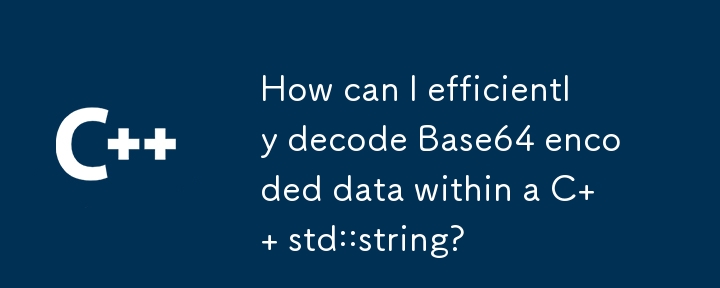
std::string 객체 내에서 바이너리 형식으로 저장된 데이터로 작업할 때 다음을 수행할 수 있습니다. Base64 디코딩이 필요합니다. 이 스니펫은 이러한 시나리오를 위해 특별히 설계된 솔루션을 제공합니다.
다음 코드는 Base64 인코딩과 디코딩을 모두 제공합니다. 기능:
base64.h:
#ifndef _BASE64_H_ #define _BASE64_H_ #include <vector> #include <string> typedef unsigned char BYTE; std::string base64_encode(BYTE const* buf, unsigned int bufLen); std::vector<BYTE> base64_decode(std::string const&); #endif
base64.cpp:
#include "base64.h"
#include <iostream>
static const std::string base64_chars =
"ABCDEFGHIJKLMNOPQRSTUVWXYZ"
"abcdefghijklmnopqrstuvwxyz"
"0123456789+/";
static inline bool is_base64(BYTE c) {
return (isalnum(c) || (c == '+') || (c == '/'));
}
std::string base64_encode(BYTE const* buf, unsigned int bufLen) {
std::string ret;
int i = 0;
int j = 0;
BYTE char_array_3[3];
BYTE char_array_4[4];
while (bufLen--) {
char_array_3[i++] = *(buf++);
if (i == 3) {
char_array_4[0] = (char_array_3[0] & 0xfc) >> 2;
char_array_4[1] = ((char_array_3[0] & 0x03) << 4) + ((char_array_3[1] & 0xf0) >> 4);
char_array_4[2] = ((char_array_3[1] & 0x0f) << 2) + ((char_array_3[2] & 0xc0) >> 6);
char_array_4[3] = char_array_3[2] & 0x3f;
for(i = 0; (i <4) ; i++)
ret += base64_chars[char_array_4[i]];
i = 0;
}
}
if (i)
{
for(j = i; j < 3; j++)
char_array_3[j] = '<pre class="brush:php;toolbar:false">std::vector<BYTE> myData;
...
std::string encodedData = base64_encode(&myData[0], myData.size());
std::vector<BYTE> decodedData = base64_decode(encodedData);이 스니펫의 사용법을 보여주기 위해 다음을 고려하세요. 다음:
위 내용은 C std::string 내에서 Base64로 인코딩된 데이터를 효율적으로 디코딩하려면 어떻게 해야 합니까?의 상세 내용입니다. 자세한 내용은 PHP 중국어 웹사이트의 기타 관련 기사를 참조하세요!